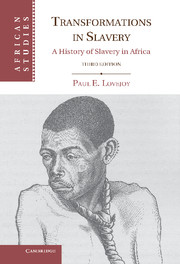Book contents
- Frontmatter
- Contents
- Maps and Tables
- Note on Currencies, Weights, and Measures
- Preface
- Preface to the Second Edition
- Preface to the Third Edition
- 1 Africa and Slavery
- 2 On the Frontiers of Islam, 1400–1600
- 3 The Export Trade in Slaves, 1600–1800
- 4 The Enslavement of Africans, 1600–1800
- 5 The Organization of Slave Marketing, 1600–1800
- 6 Relationships of Dependency, 1600–1800
- 7 The Nineteenth-Century Slave Trade
- 8 Slavery and “Legitimate Trade” on the West African Coast
- 9 Slavery in the Savanna during the Era of the Jihads
- 10 Slavery in Central, Southern, and Eastern Africa in the Nineteenth Century
- 11 The Abolitionist Impulse
- 12 Slavery in the Political Economy of Africa
- Epilogue
- Appendix Chronology of Measures against Slavery
- Notes
- Select Bibliography
- Index
- Books in this series
Preface to the Third Edition
Published online by Cambridge University Press: 05 June 2012
- Frontmatter
- Contents
- Maps and Tables
- Note on Currencies, Weights, and Measures
- Preface
- Preface to the Second Edition
- Preface to the Third Edition
- 1 Africa and Slavery
- 2 On the Frontiers of Islam, 1400–1600
- 3 The Export Trade in Slaves, 1600–1800
- 4 The Enslavement of Africans, 1600–1800
- 5 The Organization of Slave Marketing, 1600–1800
- 6 Relationships of Dependency, 1600–1800
- 7 The Nineteenth-Century Slave Trade
- 8 Slavery and “Legitimate Trade” on the West African Coast
- 9 Slavery in the Savanna during the Era of the Jihads
- 10 Slavery in Central, Southern, and Eastern Africa in the Nineteenth Century
- 11 The Abolitionist Impulse
- 12 Slavery in the Political Economy of Africa
- Epilogue
- Appendix Chronology of Measures against Slavery
- Notes
- Select Bibliography
- Index
- Books in this series
Summary
Preface to the Third Edition
I first attempted an overview of the history of slavery in Africa in 1979, in a paper first published in Historical Reflections, with responses from Igor Kopytoff and Frederick Cooper. Since then, there has been a great outburst in the study of the history of slavery, both within continental Africa and in the context of the development of the African diaspora in the Americas, the Islamic world, the Indian Ocean, and indeed Europe. My initial synthesis was prompted by the dialogue between francophone and anglophone scholarship, as represented in the collections of essays edited by Suzanne Miers and Igor Kopytoff, Slavery in Africa: Historical and Anthropological Perspectives, and by Claude Meillassoux, L’Esclavage en Afrique précoloniale, both published in 1975. Moreover, my reflections and then considerable study of the topic were also set in the context of a series of informal seminars, largely held on the floor in Martin Klein’s living room in Toronto, where a number of kindred souls read and studied Karl Marx, Das Kapital, and then his “precapitalist modes of production.” The group was attempting to come to terms with the preponderance of evidence about the pervasiveness of slavery in African history and society. It was clear that historical and anthropological research were in the process of confronting slavery. Given that Philip D. Curtin and Jan Vansina had been my mentors at the University of Wisconsin during my graduate school days, this trajectory is perhaps not surprising.
The purpose of this preface is to evaluate the progression of research on the history of slavery since the initial publication of Transformations in Slavery in 1983, and its updated second edition, published in 2000. My initial intention was to focus research on continental Africa to counter the false impression that Africa’s involvement in the slave trade was somehow passive, ahistorical, and only of interest in examining victimization and seemingly progressive underdevelopment. Somehow, a careful reading of the anthropological and historical literature revealed that this approach was not connected with African history. The challenge, therefore, was to make sense of what we know about the history of slavery in the context of political and economic change in Africa over the past several hundred years and how that related to the external traffic in enslaved Africans.
- Type
- Chapter
- Information
- Transformations in SlaveryA History of Slavery in Africa, pp. xxi - xxivPublisher: Cambridge University PressPrint publication year: 2011

